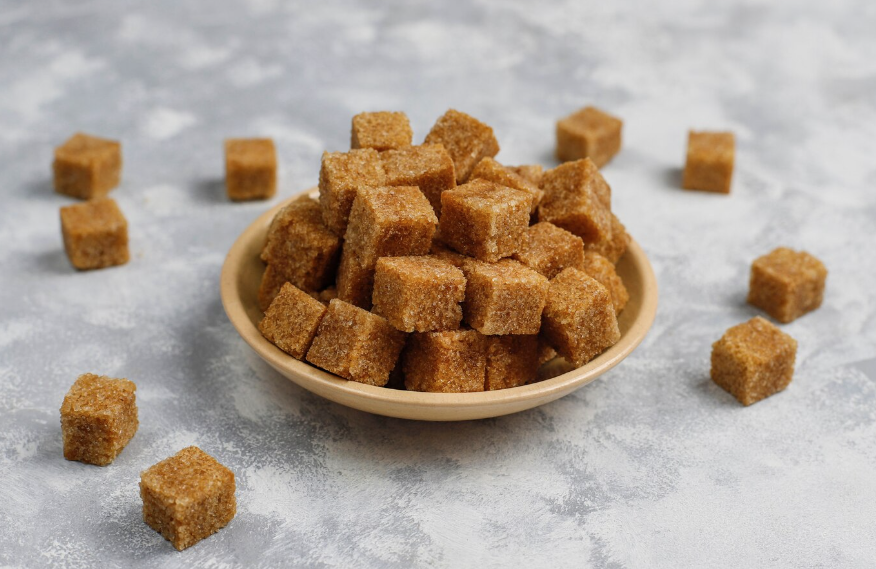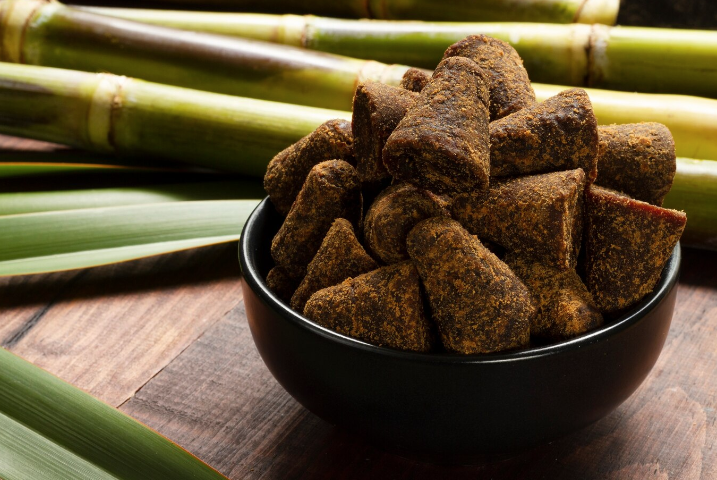Wellhealthorganic.com: Jaggery With Incredible Health Benefits
Table of Contents
Introduction
Brief Overview of Jaggery
Jaggery is a traditional, unrefined sweetener widely used in various parts of the world, particularly in Asia and Africa. Known for its rich, caramel-like flavor, jaggery is made by boiling down sugarcane juice or palm sap to create a dense, nutrient-rich block of sugar. Unlike refined sugar, jaggery retains many of the natural minerals and vitamins found in the original plant, making it a healthier alternative for those looking to reduce their intake of processed foods.
Importance of Natural Sweeteners
In an age where processed and refined foods dominate our diets, the importance of natural sweeteners like jaggery cannot be overstated. Unlike white sugar, which undergoes extensive processing and loses most of its nutritional value, natural sweeteners retain their beneficial properties. This makes them not only a healthier option but also a more sustainable one, as their production typically involves fewer chemicals and less environmental impact.
Purpose of the Article
This comprehensive guide aims to explore the myriad health benefits of jaggery, delving into its nutritional profile, various types, and the many ways it can improve overall health and well-being. From boosting immunity to aiding digestion and promoting skin health, jaggery offers a range of benefits that make it a valuable addition to any diet. Whether you’re already a fan of this natural sweetener or are curious to learn more, this article will provide all the information you need to understand and appreciate the incredible health benefits of jaggery.
What is Jaggery?
Definition and Description

Jaggery is an unrefined sugar product derived primarily from sugarcane and palm. It is produced by boiling down the juice of these plants until it solidifies into a dense, brown block or granules. Unlike refined white sugar, jaggery retains many of the natural nutrients found in the original plant material, including minerals like iron, potassium, and magnesium. Its color can range from golden yellow to dark brown, depending on the source and method of production.
History and Cultural Significance
The history of jaggery dates back thousands of years, with its origins deeply rooted in ancient Indian and African cultures. It has been used not only as a sweetener but also as a medicinal ingredient and a significant part of various cultural rituals and celebrations. In India, jaggery (known locally as “gur”) is often used in religious offerings and festive foods, symbolizing sweetness and auspiciousness. Similarly, in Africa, it plays a crucial role in traditional ceremonies and daily diets.
Comparison with Other Sweeteners
When compared to other sweeteners, jaggery stands out due to its natural production process and rich nutritional profile. Unlike white sugar, which undergoes extensive refining and bleaching, jaggery is made using traditional methods that preserve its beneficial properties. It also contains more complex carbohydrates and is digested more slowly, providing a steady release of energy without the rapid spikes and crashes associated with refined sugar.
Types of Jaggery
Sugarcane Jaggery

Sugarcane jaggery, the most common type, is made by boiling sugarcane juice until it thickens and solidifies. It has a distinct, earthy flavor and a rich brown color. This type of jaggery is widely used in Indian cuisine, both in sweet dishes and as a natural sweetener for beverages.
Date Palm Jaggery
Date palm jaggery, also known as “khajur gur,” is derived from the sap of date palm trees. It is particularly popular in the Middle East and North Africa, where it is used in traditional desserts and sweets. Date palm jaggery has a unique, slightly smoky flavor and is often considered a delicacy.
Coconut Jaggery
Coconut jaggery, or “gur nariyal,” is made from the sap of coconut palm trees. This variety is commonly used in South Indian and Southeast Asian cuisines. It has a light, caramel-like flavor and is often used in sweets and beverages.
Differences and Similarities
While all types of jaggery share the common trait of being unrefined and nutrient-rich, they differ in flavor, color, and texture due to the source of their sap and the methods used in their production. Sugarcane jaggery tends to be denser and darker, while date palm and coconut jaggery have lighter flavors and colors. Despite these differences, all types of jaggery offer similar health benefits, making them excellent natural sweeteners.
Nutritional Profile of Jaggery
Macronutrients in Jaggery
Jaggery is composed mainly of carbohydrates, with a small amount of protein and virtually no fat. A typical 100-gram serving of jaggery provides approximately 380 calories, making it a significant source of energy. The carbohydrates in jaggery are complex, providing a slow and steady release of energy, which helps maintain stable blood sugar levels.
Vitamins and Minerals
Jaggery is rich in essential vitamins and minerals that are often stripped away during the refining process of white sugar. It contains notable amounts of iron, which is crucial for maintaining healthy blood levels and preventing anemia. Additionally, jaggery provides magnesium, potassium, and calcium, all of which are vital for various bodily functions, including muscle function, bone health, and cardiovascular health.
Comparison with Refined Sugar
When compared to refined sugar, jaggery offers a more robust nutritional profile. Refined sugar provides empty calories with no significant vitamins or minerals, while jaggery supplies not only energy but also important nutrients. This makes jaggery a more healthful option for those looking to satisfy their sweet tooth without compromising their nutritional intake.
Health Benefits of Jaggery
Boosts Immunity

Jaggery is packed with antioxidants and minerals that help strengthen the immune system. The presence of selenium and zinc in jaggery helps combat oxidative stress and free radical damage, enhancing the body’s natural defense mechanisms.
Aids Digestion
Regular consumption of jaggery can aid in digestion by stimulating the secretion of digestive enzymes. It also acts as a mild laxative, helping to relieve constipation and promoting regular bowel movements.
Detoxifies the Liver
Jaggery acts as a natural detoxifier, helping to cleanse the liver by flushing out harmful toxins. This is primarily due to its high antioxidant content, which supports the liver’s natural detoxification processes.
Improves Skin Health
The antioxidants and minerals in jaggery can improve skin health by preventing oxidative damage and promoting a healthy complexion. Regular consumption of jaggery can help reduce acne, pimples, and other skin problems.
Prevents Anemia
Due to its high iron content, jaggery is an effective natural remedy for preventing anemia. It helps increase hemoglobin levels in the blood, ensuring adequate oxygen transport throughout the body and preventing fatigue and weakness.
Regulates Blood Pressure
Jaggery contains potassium and sodium, which help maintain the balance of electrolytes and regulate blood pressure. This makes it beneficial for individuals with hypertension or those looking to maintain healthy blood pressure levels.
Jaggery and Immunity
How Jaggery Boosts the Immune System
Jaggery’s role in boosting immunity is primarily attributed to its rich content of antioxidants, minerals, and vitamins. The antioxidants present in jaggery, such as phenolic compounds, help combat free radicals that can cause cellular damage and weaken the immune system. Additionally, minerals like zinc and selenium enhance immune function by supporting the activity of immune cells and reducing oxidative stress.
Role of Antioxidants in Jaggery
Antioxidants are compounds that protect the body from oxidative stress and inflammation. Jaggery is a natural source of these compounds, which help in neutralizing free radicals. This not only strengthens the immune system but also reduces the risk of chronic diseases such as cancer, heart disease, and diabetes. Regular consumption of jaggery ensures a steady supply of these beneficial antioxidants.
Benefits During Seasonal Changes
Seasonal changes often bring about a surge in common illnesses like colds, coughs, and flu. Consuming jaggery during these times can provide an added boost to the immune system, helping the body fend off infections more effectively. Its warming effect on the body also makes it a popular choice in winter, providing relief from cold-related ailments.
Jaggery for Digestive Health
Promotes Digestion

Jaggery aids digestion by stimulating the production of digestive enzymes. It also activates digestive acids in the stomach, helping in the smooth and efficient digestion of food. This makes jaggery an excellent natural remedy for indigestion and other digestive issues.
Relieves Constipation
One of the most well-known benefits of jaggery is its ability to relieve constipation. Jaggery works as a natural laxative, stimulating bowel movements and ensuring regularity. This is particularly beneficial for those who suffer from chronic constipation or irregular bowel habits.
Balances Gut Flora
A healthy gut flora is essential for overall digestive health. Jaggery acts as a prebiotic, promoting the growth of beneficial bacteria in the gut. This helps in maintaining a balanced gut microbiome, which is crucial for efficient digestion and nutrient absorption.
Detoxification with Jaggery
Mechanism of Detoxification
Jaggery helps in detoxifying the body by aiding in the removal of toxins from the liver and other organs. It acts as a natural cleanser, helping to flush out waste products and impurities. This detoxifying effect is primarily due to the presence of antioxidants and minerals that support liver function and overall detoxification processes.
Impact on Liver Health
The liver is one of the primary organs responsible for detoxifying the body. Regular consumption of jaggery supports liver health by enhancing its ability to remove toxins from the bloodstream. This reduces the burden on the liver and promotes overall health and well-being.
Overall Detox Benefits
Detoxification with jaggery offers numerous benefits, including improved digestion, better skin health, and increased energy levels. By removing toxins and waste products from the body, jaggery helps in maintaining optimal bodily functions and promoting overall health.
Skin Health Benefits
Natural Skin Cleanser
Jaggery is a natural skin cleanser that helps in removing toxins and impurities from the skin. Its antioxidant properties prevent oxidative damage, promoting a healthy and glowing complexion. Regular consumption of jaggery can help clear up skin problems such as acne and pimples.
Anti-Aging Properties
The antioxidants in jaggery help in combating the signs of aging by reducing oxidative stress and preventing cell damage. This results in smoother, younger-looking skin. Jaggery also helps in maintaining skin elasticity, reducing the appearance of wrinkles and fine lines.
Acne Prevention
Jaggery’s detoxifying properties help in preventing acne by removing toxins from the body and reducing inflammation. Its ability to balance blood sugar levels also prevents hormonal imbalances that can lead to acne breakouts. Incorporating jaggery into your diet can thus lead to clearer and healthier skin.
Jaggery and Anemia Prevention
Iron Content in Jaggery
Jaggery is a rich source of iron, making it an excellent natural remedy for preventing and treating anemia. Iron is a crucial component of hemoglobin, the protein in red blood cells that carries oxygen throughout the body. Adequate iron intake is essential for maintaining healthy blood levels and preventing anemia.
Enhancing Hemoglobin Levels
Regular consumption of jaggery can help increase hemoglobin levels in the blood. This is particularly beneficial for individuals with low hemoglobin levels or those at risk of developing anemia. Jaggery provides a natural and effective way to boost iron intake and maintain healthy blood levels.
Prevention of Fatigue and Weakness
Anemia often leads to symptoms such as fatigue, weakness, and dizziness. By improving hemoglobin levels and enhancing oxygen transport in the body, jaggery helps in alleviating these symptoms. This makes it an excellent natural remedy for preventing and managing anemia-related fatigue and weakness.
Regulating Blood Pressure with Jaggery
Potassium Content in Jaggery
Jaggery contains significant amounts of potassium, a mineral that plays a crucial role in regulating blood pressure. Potassium helps balance sodium levels in the body, reducing the strain on blood vessels and promoting healthy blood pressure levels.
Maintaining Electrolyte Balance
Electrolyte balance is essential for maintaining healthy blood pressure and overall cardiovascular health. Jaggery helps in maintaining this balance by providing essential minerals such as potassium, sodium, and magnesium. This promotes proper fluid balance and prevents issues such as hypertension and dehydration.
Heart Health Benefits
By regulating blood pressure and maintaining electrolyte balance, jaggery supports overall heart health. Its antioxidant properties also help in reducing inflammation and oxidative stress, further promoting cardiovascular health. Regular consumption of jaggery can thus contribute to a healthier heart and a reduced risk of heart disease.
Jaggery in Weight Management
Low Glycemic Index
One of the key benefits of jaggery for weight management is its low glycemic index (GI). Foods with a low GI are digested and absorbed more slowly, resulting in a gradual rise in blood sugar levels. This helps in controlling hunger and reducing overall calorie intake, making jaggery a better option for those looking to manage their weight.
Satisfying Sweet Cravings
Jaggery provides a natural way to satisfy sweet cravings without the negative effects of refined sugar. Its rich flavor and nutritional benefits make it a healthier alternative, helping individuals stick to their weight management goals without feeling deprived.
Enhancing Metabolism
Jaggery helps in boosting metabolism, which is essential for effective weight management. Its nutritional profile, including vitamins and minerals, supports various metabolic processes in the body, enhancing overall energy expenditure and promoting weight loss.
Jaggery as an Energy Booster
Slow-Releasing Energy Source
Unlike refined sugar, which causes rapid spikes and crashes in blood sugar levels, jaggery provides a slow and steady release of energy. This makes it an excellent energy booster, providing sustained energy throughout the day without the highs and lows associated with other sweeteners.
Benefits for Athletes and Active Individuals
For athletes and individuals with active lifestyles, jaggery offers a natural and effective way to boost energy levels. Its complex carbohydrates provide long-lasting energy, enhancing endurance and performance. Additionally, the minerals in jaggery help in replenishing electrolytes lost during physical activity.
Avoiding Sugar Crashes
Sugar crashes, characterized by sudden drops in energy levels, are common with refined sugar consumption. Jaggery helps in avoiding these crashes by providing a more stable release of energy. This results in better energy management and reduced fatigue throughout the day.
How Jaggery Benefits Respiratory Health
Easing Cough and Cold Symptoms

Jaggery is known for its ability to ease cough and cold symptoms. Its anti-inflammatory properties help in soothing irritated throat and reducing cough frequency. Additionally, jaggery’s warming effect provides relief from cold-related symptoms, making it a popular remedy in traditional medicine.
Clearing Respiratory Passages
Jaggery helps in clearing respiratory passages by loosening mucus and facilitating its expulsion from the body. This makes it effective in managing respiratory conditions such as bronchitis and asthma. Regular consumption of jaggery can help maintain clear and healthy respiratory passages.
Ayurvedic Uses for Respiratory Issues
In Ayurvedic medicine, jaggery is used as a remedy for various respiratory issues. It is often combined with other ingredients such as ginger and black pepper to enhance its effectiveness. These traditional remedies help in managing respiratory conditions and promoting overall respiratory health.
Jaggery and Bone Health
Calcium Content in Jaggery
Jaggery is a good source of calcium, which is essential for maintaining healthy bones and teeth. Adequate calcium intake is crucial for preventing bone-related issues such as osteoporosis and fractures. Including jaggery in your diet can help in meeting your daily calcium requirements.
Enhancing Bone Density
Regular consumption of jaggery can help in enhancing bone density, making bones stronger and less prone to fractures. This is particularly important for individuals at risk of osteoporosis or those looking to maintain strong and healthy bones as they age.
Prevention of Osteoporosis
Osteoporosis is a condition characterized by weak and brittle bones, often due to calcium deficiency. By providing a natural source of calcium, jaggery helps in preventing osteoporosis and maintaining overall bone health. This makes it a valuable addition to a bone-healthy diet.
Jaggery During Pregnancy
Nutritional Benefits for Expectant Mothers
Jaggery offers numerous nutritional benefits for expectant mothers. Its rich content of iron, calcium, and other essential nutrients supports the health and well-being of both the mother and the developing baby. This makes jaggery an excellent natural supplement during pregnancy.
Preventing Pregnancy-Related Anemia
Anemia is a common concern during pregnancy, often due to increased iron requirements. Jaggery helps in preventing pregnancy-related anemia by providing a natural and effective source of iron. This ensures adequate hemoglobin levels and prevents symptoms such as fatigue and weakness.
Promoting Healthy Fetal Development
The vitamins and minerals in jaggery support healthy fetal development by providing essential nutrients required for growth and development. This includes supporting the development of healthy bones, muscles, and tissues, making jaggery a beneficial addition to the prenatal diet.
Culinary Uses of Jaggery
Traditional Recipes
Jaggery is a staple ingredient in many traditional recipes, particularly in Indian and Southeast Asian cuisines. It is used in a variety of sweets, desserts, and beverages, adding a rich and unique flavor. Popular traditional dishes include jaggery-based sweets such as “gur ladoo,” “gur chana,” and “payasam.”
Modern Culinary Applications
In addition to traditional recipes, jaggery is increasingly being used in modern culinary applications. It can be used as a natural sweetener in baking, smoothies, and sauces, providing a healthier alternative to refined sugar. Its distinct flavor also adds depth and richness to savory dishes.
Sweet and Savory Dishes
Jaggery’s versatility makes it suitable for both sweet and savory dishes. In sweet dishes, it adds a rich, caramel-like flavor, while in savory dishes, it provides a balanced sweetness that complements spices and other flavors. This makes jaggery a valuable ingredient in a wide range of culinary applications.
How to Incorporate Jaggery into Your Diet
Daily Intake Recommendations
While jaggery offers numerous health benefits, it is important to consume it in moderation. The recommended daily intake varies depending on individual health needs and dietary requirements. Generally, a small amount of jaggery, around 10-20 grams per day, can provide health benefits without contributing to excessive calorie intake.
Easy Ways to Use Jaggery
There are many easy and delicious ways to incorporate jaggery into your diet. It can be added to tea or coffee as a natural sweetener, used in baking recipes, or melted and drizzled over pancakes or oatmeal. Jaggery can also be used in savory dishes, such as marinades and sauces, to add a touch of sweetness.
Substituting Jaggery for Sugar
Jaggery can be used as a direct substitute for sugar in most recipes. When substituting, it is important to note that jaggery has a stronger flavor and may slightly alter the taste and texture of the dish. However, its nutritional benefits make it a worthwhile substitution for those looking to reduce their intake of refined sugar.
Jaggery in Traditional Medicine
Ayurvedic Uses
In Ayurvedic medicine, jaggery is considered a valuable remedy for various health issues. It is used to balance the “doshas” (body energies), improve digestion, and boost overall health. Jaggery is often combined with other herbs and ingredients to enhance its medicinal properties and treat specific ailments.
Folk Remedies
Jaggery has been used in folk medicine for centuries to treat a range of health problems. Common remedies include using jaggery to soothe sore throats, alleviate menstrual pain, and boost energy levels. These traditional remedies highlight the versatility and effectiveness of jaggery as a natural healing agent.
Modern Scientific Validation
Modern scientific research has begun to validate many of the traditional uses of jaggery. Studies have shown that jaggery’s nutritional profile and health benefits make it a valuable addition to a balanced diet. Ongoing research continues to explore the various ways in which jaggery can support health and well-being.
Jaggery Production Process
Traditional Methods

Traditional methods of jaggery production involve extracting juice from sugarcane or palm trees and boiling it down to form a thick syrup. This syrup is then poured into molds and allowed to cool and solidify. These traditional methods help retain the natural nutrients and flavors of the raw materials.
Modern Manufacturing
Modern manufacturing techniques for jaggery production involve more controlled and hygienic processes. These techniques help in producing high-quality jaggery with consistent texture and flavor. However, the basic principles of boiling and solidifying the raw juice remain the same, ensuring that the nutritional benefits are preserved.
Quality Considerations
The quality of jaggery depends on several factors, including the source of the raw material, the production process, and the handling and storage conditions. High-quality jaggery should be free from impurities, have a uniform color, and possess a rich, caramel-like flavor. Proper quality control measures are essential to ensure that the jaggery retains its beneficial properties.
Potential Side Effects and Precautions
Overconsumption Risks
While jaggery offers numerous health benefits, it is important to consume it in moderation. Overconsumption of jaggery can lead to excessive calorie intake, which may contribute to weight gain and other health issues. Additionally, consuming large amounts of jaggery can cause spikes in blood sugar levels, particularly in individuals with diabetes.
Allergic Reactions
Although rare, some individuals may experience allergic reactions to jaggery. Symptoms of an allergic reaction can include itching, swelling, and difficulty breathing. If you experience any of these symptoms after consuming jaggery, it is important to seek medical attention immediately.
Safe Consumption Guidelines
To enjoy the health benefits of jaggery without experiencing adverse effects, it is important to follow safe consumption guidelines. This includes moderating intake, ensuring the jaggery is of high quality, and consulting with a healthcare professional if you have any underlying health conditions or concerns.
Buying and Storing Jaggery
Selecting High-Quality Jaggery
When buying jaggery, it is important to select high-quality products. Look for jaggery that has a uniform color, free from impurities, and has a rich, caramel-like aroma. Avoid jaggery that appears overly dry or has a whitish coating, as this may indicate poor quality or contamination.
Proper Storage Techniques
Proper storage of jaggery is essential to maintain its quality and prevent spoilage. Jaggery should be stored in an airtight container in a cool, dry place, away from direct sunlight. This helps in preserving its flavor, texture, and nutritional benefits.
Shelf Life and Usage Tips
Jaggery has a relatively long shelf life when stored properly. However, it is important to check for signs of spoilage, such as mold or an off smell, before use. To make the most of jaggery, consider using it in a variety of recipes and incorporating it into your daily diet in moderation.
Environmental Impact of Jaggery Production
Sustainable Farming Practices
Jaggery production often involves sustainable farming practices that are beneficial for the environment. For example, sugarcane and palm trees used in jaggery production are often grown using traditional farming methods that minimize the use of chemical fertilizers and pesticides.
Environmental Benefits of Jaggery Production
Compared to the production of refined sugar, jaggery production has a lower environmental impact. The traditional methods used in jaggery production require less energy and water, resulting in a smaller carbon footprint. Additionally, the use of natural ingredients and minimal processing makes jaggery a more environmentally friendly option.
Comparison with Refined Sugar Production
The production of refined sugar involves extensive processing, bleaching, and the use of various chemicals, which can have significant environmental impacts. In contrast, jaggery production is more natural and less resource-intensive, making it a more sustainable and eco-friendly alternative to refined sugar.
Conclusion Of Wellhealthorganic.com: Jaggery With Incredible Health Benefits:
Recap of Health Benefits
Jaggery is a nutrient-rich, unrefined sweetener that offers a wide range of health benefits. From boosting immunity and aiding digestion to detoxifying the liver and improving skin health, jaggery is a versatile and beneficial addition to any diet. Its rich content of vitamins, minerals, and antioxidants makes it a superior alternative to refined sugar.
Encouragement to Incorporate Jaggery into the Diet
Incorporating jaggery into your diet is a simple and effective way to enjoy its numerous health benefits. Whether used in traditional recipes or modern culinary applications, jaggery provides a natural and nutritious way to sweeten your food and beverages. By making the switch to jaggery, you can enhance your overall health and well-being.
FAQs About Wellhealthorganic.com: Jaggery With Incredible Health Benefits:
What is Wellhealthorganic.com?
Wellhealthorganic.com is an online platform dedicated to promoting health and wellness through organic products and natural remedies. The website provides information on various health topics, including the benefits of natural foods like jaggery, and offers a range of organic products for purchase.
What Information Does Wellhealthorganic.com Provide About Jaggery?
Wellhealthorganic.com offers comprehensive information about jaggery, including:
- Its nutritional content
- Health benefits
- Traditional and modern uses
- Recipes and culinary tips
- Comparison with refined sugar
- Guidelines for safe consumption
Why is Jaggery Considered to Have Incredible Health Benefits?
Jaggery is considered to have incredible health benefits because it is rich in essential nutrients like iron, calcium, magnesium, and potassium. It also contains antioxidants, which help combat oxidative stress and inflammation. These properties contribute to various health benefits, including improved digestion, enhanced immunity, better skin health, and more.
How Can I Incorporate Jaggery Into My Daily Diet?
According to Wellhealthorganic.com, you can incorporate jaggery into your daily diet in several ways:
- Use it as a natural sweetener in tea or coffee.
- Add it to baked goods like cakes, cookies, and bread.
- Melt it and drizzle over pancakes, waffles, or oatmeal.
- Use it in traditional sweets and desserts.
- Add it to savory dishes, such as curries and marinades, to balance flavors.
What are the Specific Health Benefits of Jaggery Mentioned on Wellhealthorganic.com?
Wellhealthorganic.com highlights several health benefits of jaggery, including:
- Boosting the immune system
- Aiding digestion and relieving constipation
- Detoxifying the liver
- Improving skin health
- Preventing anemia
- Regulating blood pressure
- Providing sustained energy
- Supporting respiratory health
- Promoting bone health
Is Jaggery a Better Alternative to Refined Sugar?
Yes, Wellhealthorganic.com advocates for jaggery as a
better alternative to refined sugar due to its higher nutritional content and health benefits. Unlike refined sugar, which provides empty calories, jaggery contains vitamins, minerals, and antioxidants that contribute to overall health and well-being.
Can Jaggery Be Consumed by Diabetics?
While jaggery has a lower glycemic index compared to refined sugar, it still contains sugars that can affect blood glucose levels. Wellhealthorganic.com advises that diabetics should consume jaggery in moderation and consult with their healthcare provider to determine if it fits into their dietary plan.
How Much Jaggery Should I Consume Daily?
Wellhealthorganic.com recommends consuming jaggery in moderation. A daily intake of about 10-20 grams can provide health benefits without contributing to excessive calorie intake. It’s important to adjust the amount based on individual health needs and dietary requirements.
Are There Any Side Effects of Consuming Jaggery?
Consuming jaggery in excess can lead to:
- Weight gain due to high calorie content
- Blood sugar spikes, particularly in individuals with diabetes
- Potential allergic reactions, although these are rare
How Should Jaggery Be Stored?
To maintain its quality and prevent spoilage, jaggery should be stored in an airtight container in a cool, dry place away from direct sunlight. Proper storage helps preserve its flavor, texture, and nutritional benefits. Wellhealthorganic.com also suggests checking for signs of spoilage, such as mold or an off smell, before use.
What Makes Jaggery Environmentally Friendly?
Jaggery production is generally more environmentally friendly compared to refined sugar production. Wellhealthorganic.com notes that traditional methods of jaggery production use less energy and water, involve fewer chemical processes, and have a smaller carbon footprint. This makes jaggery a more sustainable and eco-friendly option.
Can Jaggery Be Used in Cooking and Baking?
Yes, jaggery can be used in both cooking and baking. It provides a rich, caramel-like flavor and adds depth to dishes. Wellhealthorganic.com suggests using jaggery in:
- Traditional sweets and desserts
- Savory dishes like curries and stews
- Baking recipes for cakes, cookies, and bread
- Beverages like tea and coffee
Where Can I Buy High-Quality Jaggery?
Wellhealthorganic.com recommends purchasing jaggery from reputable sources to ensure quality. Look for jaggery that has a uniform color, free from impurities, and a rich, caramel-like aroma. High-quality jaggery is often available at organic food stores, health food stores, and online retailers specializing in organic products.
What Should I Look for When Buying Jaggery?
When buying jaggery, Wellhealthorganic.com advises looking for:
- Uniform color and texture
- Free from impurities and white spots
- Rich, caramel-like aroma
- Proper packaging to avoid contamination
How Does Jaggery Compare with Other Natural Sweeteners?
Jaggery compares favorably with other natural sweeteners like honey, maple syrup, and coconut sugar. According to Wellhealthorganic.com, jaggery offers a unique nutritional profile, providing essential minerals and antioxidants. Each natural sweetener has its own benefits, and jaggery stands out for its traditional use and health benefits.
Is Jaggery Safe for Children?
Yes, jaggery is generally safe for children and can be a healthier alternative to refined sugar. Wellhealthorganic.com suggests incorporating jaggery into children’s diets in moderation to provide them with essential nutrients and a natural source of energy.
How Does Jaggery Help in Detoxifying the Liver?
Jaggery helps detoxify the liver by flushing out toxins. Its natural cleansing properties and rich nutrient content support liver function and overall detoxification processes in the body, as highlighted by Wellhealthorganic.com.
Can Jaggery Improve Skin Health?
Yes, jaggery can improve skin health. Wellhealthorganic.com mentions that the vitamins and antioxidants in jaggery help combat free radicals, promote healthy skin cells, and enhance skin elasticity, resulting in healthier and more radiant skin.
What Role Does Jaggery Play in Traditional Medicine?
In traditional medicine, jaggery is used to balance body energies, improve digestion, and treat various ailments. Wellhealthorganic.com notes its use in Ayurveda for balancing the doshas, boosting immunity, and improving overall health.
If you found our content (Wellhealthorganic.com: Jaggery With Incredible Health Benefits) helpful don’t forget to share it on your social media: Twitter
More Articles: Home





2 Comments